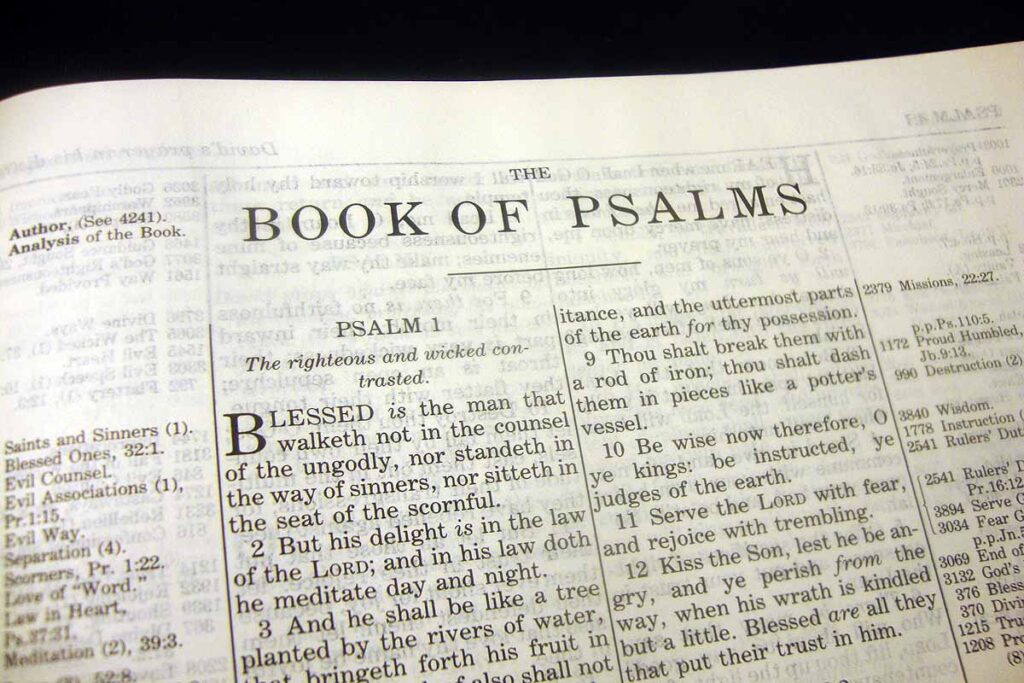The Book of Psalms
Book I – Psalms 1:1 – 41:13
While the psalms are not organized by topic, it is helpful to compare the dominant themes in each section of the psalms to the five books of Moses. The first collection of psalms, mainly written by David, is similar to the book of Genesis. Just as Genesis tells how mankind was created, fell into sin, and was promised redemption, many of these psalms discuss humans blessed, fallen, and redeemed by God.
Book II – Psalms 42:1 – 72:20
This collection of psalms, mainly written by David and the sons of Korah, is similar to the book of Exodus. Just as Exodus describes the nation of Israel, many of these psalms describe the nation as ruined and then recovered. As God rescued the nation of Israel, he also rescues us. We do not have to work out solutions first, but we can go to God with our problems and ask him to help.
Book III – Psalms 73:1 – 89:52
This collection of psalms, mainly written by Asaph or Asaph’s descendants, is similar to the book of Leviticus. Just as Leviticus discusses the tabernacle and God’s holiness, many of these psalms discuss the temple and God’s enthronement. Because God is almighty, we can turn to him for deliverance. These psalms praise God because he is holy and his perfect holiness deserves our worship and reverence.
Book IV – Psalms 90:1 – 106:48
This collection of psalms, mainly written by unknown authors, is similar to the book of Numbers. Just as Numbers discusses the relationship of the nation if Israel to surrounding nations, these psalms often mention the relationship of God’s overruling kingdom to the other nations. Because we are citizens of the kingdom of God, we can keep the events and troubles of the earth in their proper perspective.
Book V – Psalms 107:1 – 150:6
This collection of psalms, mainly written by David, is similar to the book of Deuteronomy. Just as Deuteronomy was concerned with God and his Word, these psalms are anthems of praise and thanksgiving for God and his Word. Most of the psalms were originally set to music and used in worship. We can use these psalms today as they were used in the past, as a hymnbook of praise and worship. This is a book that ought to make our hearts sin.
Writer
The book of Psalms is a compilation of several ancient collections of Hebrew songs and poetry for use in congregational worship as well as in private devotion. In some collections the ancient compilers gathered together mostly David’s superb songs – he wrote seventy-three of them. In others, they drew from a variety of Authors such as Moses, the Levitical singing clans of Asaph and Korah, Solomon, Ethan, Heman, and Jeduthun. Forty-nine are from unnamed sources. Jewish scholars called these “orphan psalms.”
Purpose
The book of Psalms reveals the priority and power of worship as its central theme because praise and worship are worthy of the Lord solely because of His majesty. But within the psalms, God reveals a companion purpose – that which we gain from worship and praise. The psalms reveal praise as an essential means by which redeemed humankind realizes his fullest dignity and destiny. With worship, praise is a God-ordained capacity to apply the authority to which our regeneration as sons and daughters of God has restored us. Praise is a means of exercising redeemed humanity’s reinstatement to partnership with God in exercising the power of His throne over earth’s affairs (Ephesians 2:6).
Date Written
The individual psalms may have been written at dates extending from the Exodus to the restoration after the Babylonian exile. But the small collections seem to have been gathered at specific periods in Israel’s history; the reign of King David (1 Chronicles 23:5), the rule of Hezekiah (2 Chronicles 29:30), and during the leadership of Ezra and Nehemiah (Nehemiah 12:24, 26). This collection process helps explain duplication of some psalms. For example, Psalm 14 is similar to Psalm 53.
Theological Contribution
We may think of the psalms as a description of our human response to God. At times God is presented in all His majesty and glory, and our response is wonder, awe, and fear. Other psalms portray God as a loving Lord who is involved in our lives, and our response is to draw close to His comfort and security.
The psalms also have a great deal to say about the person and work of Christ: He would be crucified (Psalms 22); He would be a priest like Melchizedek (Psalms 110:4; Hebrews 5:6); He would pray for His enemies (Psalm 109:4; Luke 23:34); and His throne would be established forever (Psalm 45:6; Hebrews 1:8).
Recommended Bible Study Resources
ESV Study Bible – Study Bibles give you a deeper understanding of God’s Word with tools for life application like commentary, maps, charts, concordance, and study notes. Search our popular translations- NIV, ESV, NKJV, KJV and more!
Believer’s Bible Commentary: Second Edition – A Bible commentary is a written, systematic series of explanations and interpretations of Scripture. Commentaries often analyze or expound on individual books of the Bible, chapter by chapter and verse by verse. Some commentary works provide analysis of the whole of Scripture.
The New Strong’s Expanded Exhaustive Concordance of the Bible – The best concordance for word study! This exclusive new edition of a legendary classic puts generations of biblical research at your fingertips. A valuable tool for pastors, teachers, and students of the Bible.
Vine’s Complete Expository Dictionary of Old and New Testament Words – This classic word study resource allows you to study the meaning of biblical words in the original languages without spending years learning Greek or Hebrew. A great resource for students, seasoned pastors, and anyone who enjoys biblical word studies–even if they have little to no formal training in Hebrew or Greek.
Halley’s Bible Handbook – The beloved and classic Bible companion has been thoroughly updated, while retaining its time-honored features and Dr. Halley’s highly personal style, to offer even greater clarity, insight, and usefulness.
Click here to download or print the Bible outline “Psalms – Praise Ye the Lord“.






